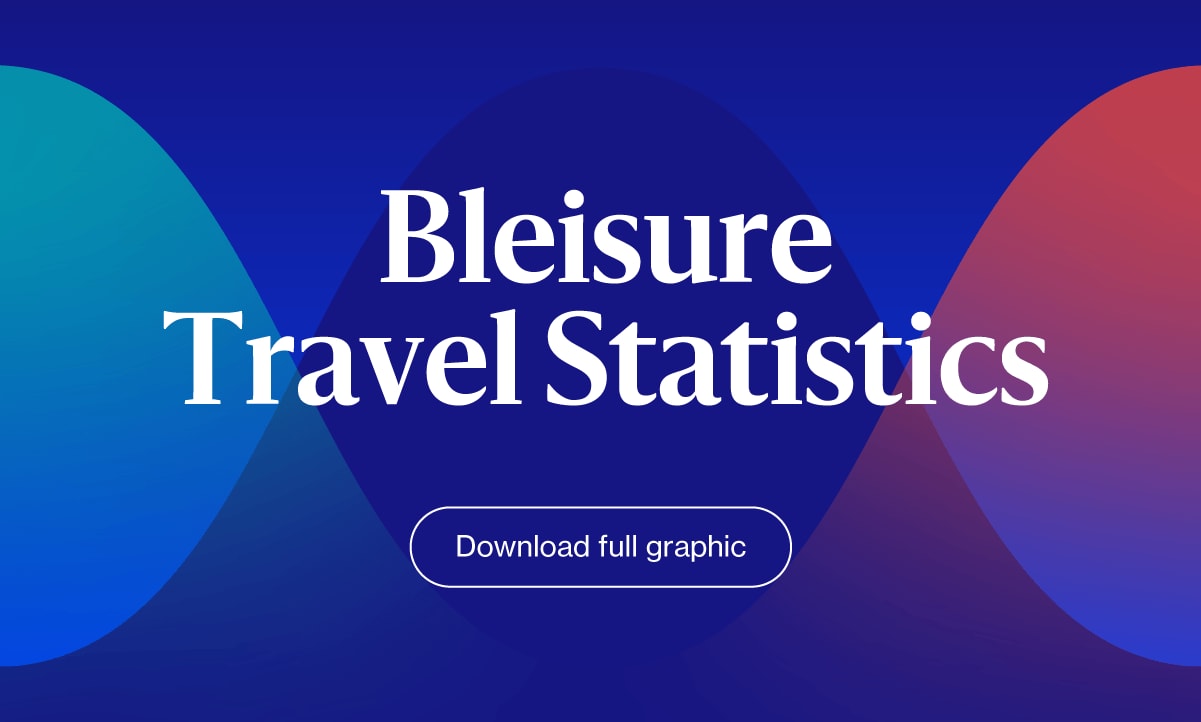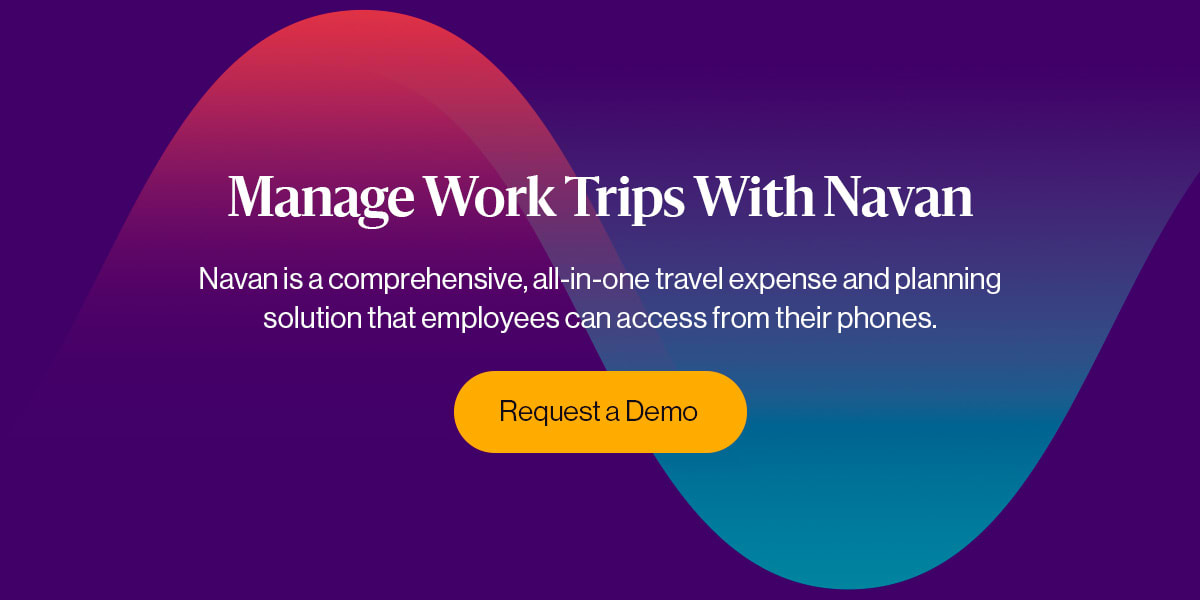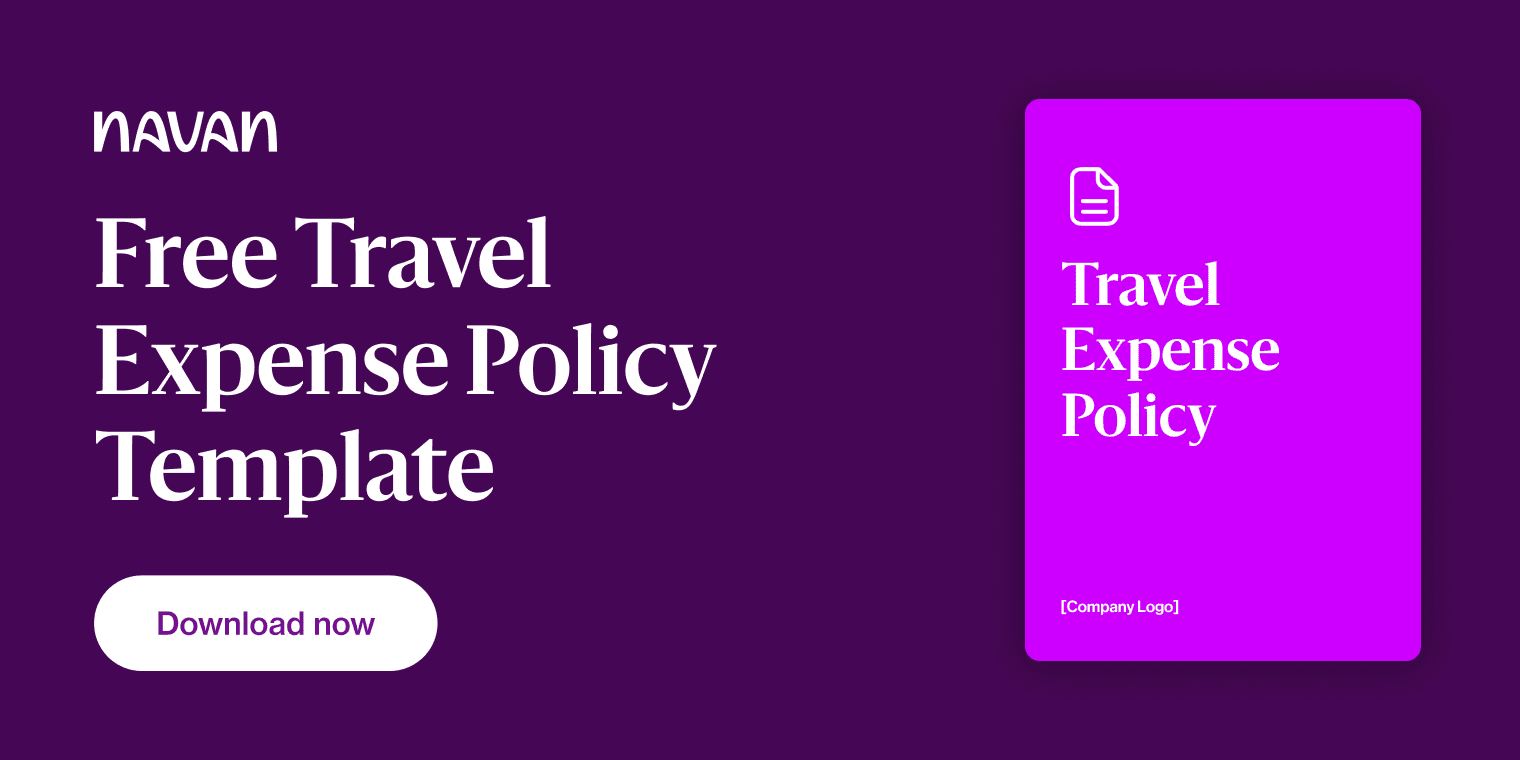87 Facts that Tell the Story of Online Travel Booking in 2025

The travel industry has undergone a profound digital transformation, which has reshaped how individuals and businesses approach travel planning and booking.
Once a fragmented and time-intensive process — reliant on phone calls and traditional travel agencies — travel booking and trip management has evolved into a streamlined, data-driven experience powered by technology. Today, businesses can achieve greater cost efficiency, improve policy compliance, and create seamless travel experiences for employees.
Consider this: In 2024, the global online travel market was valued at $523 billion and is projected to reach $1.3 trillion by 2030, growing at an impressive annual growth rate of 13.1%.
This exponential growth underscores the increasing reliance on online platforms and mobile-first solutions to meet the diverse needs of modern travelers. From personalized booking experiences to sustainability-focused innovations, the online travel ecosystem is at the forefront of technological advancement.
This article looks at 87 key statistics and trends shaping the online travel landscape in 2025.
Whether you’re a corporate travel manager or a tech-savvy business leader — or are simply curious about the future of travel — these insights will equip you with essential knowledge about this rapidly evolving environment.
A Snapshot of the Online Travel Industry
Understanding the growth of the online travel industry is critical for corporate travel planners who need to navigate a rapidly expanding market. By keeping up with these trends, businesses can leverage digital platforms to streamline travel management and improve employee satisfaction.
The online travel industry has seen steady growth over the past decade, with no signs of slowing down. Here are some key statistics that highlight its expansion:
- The global online travel market was valued at $512.5 billion in 2023 and is expected to reach $1.26 trillion by 2030, with a compound annual growth rate (CAGR) of 10.6%. (1)
- The global travel industry surged by 24% in 2023, reaching $1.5 trillion and surpassing pre-pandemic levels. (2)
- North America remains the largest travel market, while Europe and Asia-Pacific are leading in online booking penetration, with each projected to reach 69% by 2026. (2)
- 72% of travelers preferred online booking in 2023, compared to just 12% who chose agencies. (3)
- Business travel spending is set to surpass $1.48 trillion by the end of 2024 and could exceed $2 trillion by 2028. (4)
- 82% of business travelers and 80% of travel and finance managers consider business travel to be either “an essential investment” or “a necessary cost” for their organization. (5)
- In the fall of 2024, flight prices on Navan had increased by 18% since 2019, while taxes and fees had risen by 25% over the same period. (6)
- International flight bookings on Navan in the fall of 2024 were up 9 percentage points since 2019, signaling a growing preference for cross-border travel. (6)
- The GDP of the Travel & Tourism sector is expected to grow at an average annual rate of 5.8% from 2022 to 2032. (7)
Key Takeaways
The online travel industry is expanding rapidly, driven by increasing business travel and the shift to digital booking solutions. More employees across different departments are traveling, and the rise in international trips reflects a more global approach to business. At the same time, higher travel costs emphasize the need for smarter budget management.
How Travelers Research and Book Online
Corporate travel teams must stay ahead of evolving consumer research and booking behaviors. By understanding these patterns, businesses can choose platforms that align with their employees’ preferences.
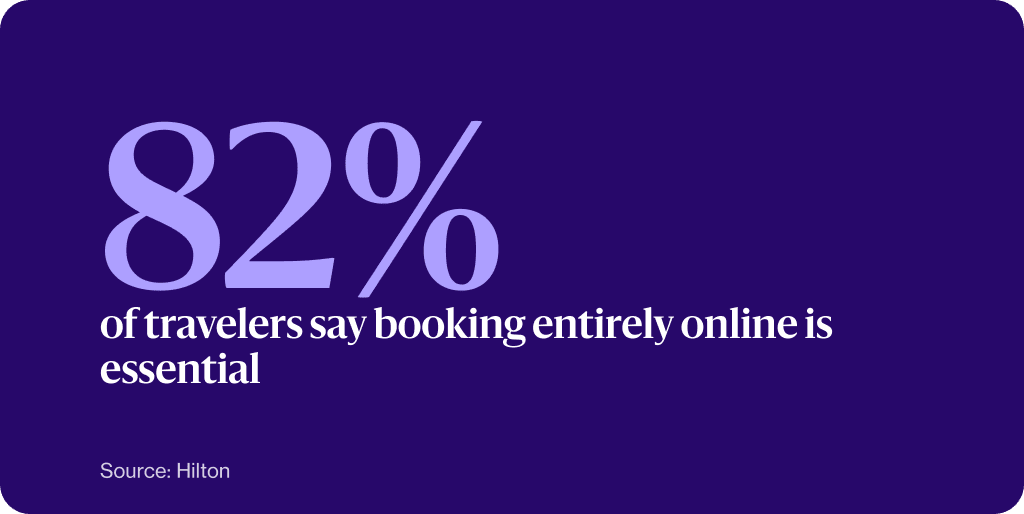
Travelers’ behaviors when researching and booking trips online have evolved significantly due to new technologies and shifting priorities:
- The purpose of business trips has shifted, with office visits for Navan customers increasing from 28% in 2019 to 33% in 2024 and conference travel rising from 12% to 15% in the same period. (6)
- 79% of business travelers and 82% of travel managers agree that meeting in person is more effective than virtual meetings. (5)
- Business travelers on Navan are booking flights an average of 6.2 days earlier than before, reflecting a shift toward structured planning. (6)
- The top two reasons for business travel in 2025 are visiting clients and developing new relationships, showing a shift from traditional reasons like closing deals. (5)
- Travel app revenue surpassed $2 billion globally in 2024, fueled by growing demand for mobile-first solutions. (8)
- On average, travelers consume 303 minutes of travel content in the 45 days prior to booking a trip (9)
- 80% of travelers say booking entirely online is essential, with millennials and Gen Z leading in the rate of adoption. (10)
- 48% of travelers now trust AI to plan their trips (Travel Predictions 2024, Booking.com)
- In 2024, bleisure travel bookings on Navan surged nearly 4x year-over-year, as more employees extended work trips for leisure. (6)
- More than half of business travelers say they take time to explore the local area during work trips. (5)
- 40% of business travelers take at least two bleisure trips per year, while 10% take four or more. (5)
Key Takeaways
Business travel priorities are shifting, with office visits and conference travel on the rise and bleisure bookings growing rapidly. Many travelers enjoy exploring local areas during a business trip, reflecting a desire for some “me” time, even in the midst of meetings.
Booking behavior has also changed, with earlier flight bookings and a preference for fully online travel planning that’s driven by younger generations. AI is gaining trust for trip planning, signaling a move toward more tech-driven travel experiences.
Shifts in Business Travel Booking
Business travel is evolving to prioritize flexibility, transparency, and sustainability. Understanding these shifts allows companies to implement travel programs that meet modern expectations while managing costs and reducing environmental impact.
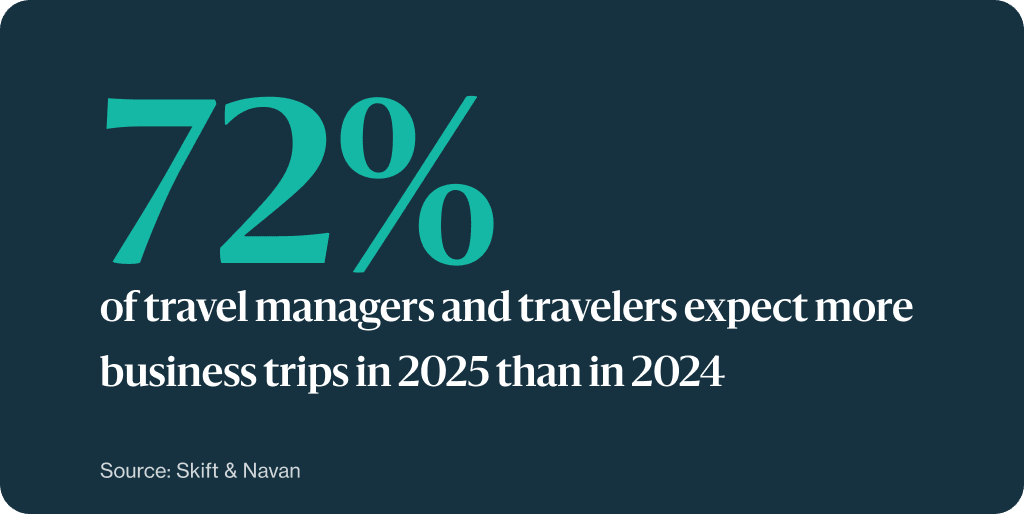
Business travel has undergone significant changes post-pandemic, with technology and flexibility playing pivotal roles:
- Nearly 75% of business travelers will travel more as a group in 2025 than during the year before. (5)
- 72% of travel managers and travelers expect to take more business trips in 2025 than in 2024. (5)
- The median number of employees at mid-market companies booking travel on Navan has increased by nearly 60% since 2019. (6)
- More than 60% of travelers expect to attend at least two offsites in 2025, with 15% traveling for four or more. (5)
- The share of non-sales teams traveling for business on Navan has risen from 49% in 2019 to 57% in 2024, reflecting more cross-functional corporate mobility. (5)
- Only 18% of business travelers book all travel through their company’s designated platform, signaling potential policy reinforcement needs. (5)
- Business travelers on Navan are booking flights 6.2 days earlier than before, reflecting a shift toward more structured planning. (6)
- Sales teams, which accounted for 51% of business travel on Navan in 2019, have dropped to 43–44% in recent years — a number that stabilized after the pandemic. (6)
- Marketing, engineering, and operations teams have increased their share of business travel on Navan, reflecting more cross-functional corporate mobility. (6)
- Only 56% of travelers aware of their company’s corporate booking tools consistently use them, indicating room for increased adoption of employer-provided booking platforms. (11)
- 71% of corporate travel buyers saw an increase in their company’s business travel bookings in 2024 compared to 2023. (12)
- 74% of corporate travel managers cite rising travel costs as one of their top three challenges for 2025. (13)
Key Takeaways
Business travel is becoming more dynamic, with an uptick in group travel and offsite meetings and a rise in cross-functional teams hitting the road. Despite this, many travelers are still turning to third-party booking platforms instead of company-approved tools, suggesting room for improvement in policy adherence.
Mobile’s Growing Role in Travel Booking
The rise of mobile-first strategies presents an opportunity for companies to make travel booking more accessible and seamless for employees. Embracing mobile solutions can also enhance productivity and support last-minute travel needs.
The shift to mobile-first strategies is undeniable, with travelers increasingly relying on their smartphones to plan and book their trips:
- Travel app downloads increased by 34% between 2019 and 2023. (14)
- Mobile devices made up 70.5% of global online travel traffic in 2024, yet desktop devices still lead in conversion rates for actual bookings. (15)
- Mobile wallet usage for travel bookings grew by 30% in 2024, making it a preferred payment method. (5)
- Mobile bookings, which now account for 37% of all travel sales, are projected to rise to 44% by 2029 due to seamless mobile payments and embedded finance solutions. (16)
- Travel apps generated $629 billion in revenue in 2024 — a 13% increase from the previous year. (17)
- The mobile travel booking market is projected to grow from approximately $228.4 billion in 2024 to more than $526.4 billion by 2032, reflecting a compound annual growth rate (CAGR) of 11%. (18)
- North America accounts for about 35% of the market, fueled by high smartphone use, broad internet access, and a strong mobile commerce ecosystem. (18)
- 33% of travelers rely on airline apps, while 28% use third-party apps for real-time flight information on the day of travel. (19)
- 76% of global travelers appreciate travel apps that reduce the friction and stress of travel. (10)
Key Takeaways
Mobile devices are increasingly driving business travel bookings, with more travelers using mobile for last-minute hotel reservations and for booking through employer-provided apps. Mobile wallets are becoming a preferred payment method, and the mobile travel market is set to grow significantly. As mobile engagement continues to rise, companies must prioritize mobile-first strategies to meet the needs of today’s tech-driven travelers.
Sustainability and Travel
Sustainability is no longer just a buzzword — it’s a core expectation for many corporate travel programs. Companies that invest in sustainable travel practices can meet employee demands and align with global ESG (environmental, social, and governance) goals.

The demand for sustainable travel continues to grow, driven by both consumer preferences and corporate responsibility:
- Rail bookings on Navan have risen from 1% in 2019 to 6% in 2024, reflecting an increased interest in sustainable travel solutions. (6)
- More companies are proactively addressing sustainability: In 2024, 46% had a strategy for assigning travel emission budgets to teams and individuals, up from 30% in 2023. (20)
- 77% of corporate travel managers encourage employees to seek sustainable alternatives when booking travel, up from 69% the previous year. (5)
- 72% of managers offer tools to track, measure, and manage travel-related carbon emissions — a 10% year-over-year increase. (5)
- 43% of travelers are willing to pay extra for travel options with a sustainable certification (21)
- 62% of companies are currently tracking their business travel emissions, with an additional 14% planning to do so within the next year. (22)
- 49% of companies are publicly disclosing and reporting their corporate value chain emissions, which includes business travel, and another 14% plan to start soon. (22)
- 82% of millennial and Gen Z travelers are interested in minimizing their environmental impact while traveling. (23)
- 97% of travelers are more likely to book travel and experiences with companies that support environmental and social initiatives (24)
- 65% of travelers would feel better about staying in a particular accommodation if they knew it had a sustainability certification. (25)
- 83% of global travelers consider sustainable travel important, yet 49% say there aren’t enough eco-friendly options. (26)
- Rail travel is forecasted to grow at a 12.7% CAGR from 2024–2029, nearly doubling its global market share to 24% of all travel modes by 2029. (16)
Key Takeaways
Sustainable travel is on the rise, with more companies adopting strategies to manage emissions and encourage eco-friendly alternatives. Rail travel is growing, and many travelers are willing to pay more for sustainable options. Companies are increasingly tracking and reporting their travel-related emissions, driven by both corporate responsibility and consumer demand for greener travel choices.

Above: Navan’s carbon emissions analytics tool
Biggest Travel Challenges and Pain Points
Addressing the everyday frustrations of online travel booking is crucial for businesses to help provide smooth travel experiences for employees. Tackling these pain points can improve compliance, reduce stress, and save time.
Despite its many advantages, online travel booking isn’t without its challenges:
- 58% of travelers feel overwhelmed by the volume of choices available when booking travel. (27)
- 56% of travelers find airline offers more difficult to understand compared to a decade ago. (27)
- 71% of travelers feel anxious about whether they secured the best deal after booking their trip. (27)
- In 2024, approximately 23% of passengers departing from U.S. airports experienced a flight delay or cancellation. (28)
- About 21% of all flights in 2024 arrived at least 15 minutes later than scheduled. (29)
- 74% of travel buyers rank rising travel costs and corporate budgets not keeping pace among the top three challenges they expect to face in 2025. (12)
- Only 16% of travel managers reported 100% compliance with corporate travel policies. (5)
- 40% of travel managers say employees book off-platform due to a lack of inventory. (5)
- 46% of business travelers book off-platform to find cheaper flights and hotels. (5)
- 60% of business travelers would book cheaper hotels if financially incentivized by their company, but only 2% of companies offer such an incentive. (5)
- Flight booking prices on Navan last fall dropped 2% on average from 2023, but August 2024 saw the highest year-over-year increase — 5%. (6)
Key Takeaways
Despite the advantages, online travel booking presents several challenges. Compliance with corporate travel policies remains low, and many employees book off-platform for better prices or more options. Travelers also struggle with an overwhelming array of choices and a lack of clarity. Rising travel costs and flight delays make it harder for companies to manage travel budgets effectively. Additionally, incentives for employees to book cost-effective options are rare, highlighting a gap in corporate travel management strategies.
The Role of Online Travel Agencies (OTAs)
OTAs remain integral to the travel booking process for leisure and corporate travelers. By effectively leveraging OTAs, companies can access diverse options, better pricing, and streamlined processes.
OTAs remain a dominant force in the travel booking landscape, offering unmatched convenience and inventory:
- 80% of business travelers use an OTA at some point in their booking journey. (Understanding the traveler’s online path to purchase, Expedia group)
- 70% of bookings on OTAs are for hotels, while flights account for 25%. (5)
- The OTA market is expected to reach approximately $1.6942 billion by 2033, exhibiting a compound annual growth rate (CAGR) of 13.8% from 2023 to 2033. (30)
- Four in five travelers visit an OTA at some point before making a travel purchase, indicating that travelers likely visit OTAs for inspiration, research, or planning purposes, even if travelers book on another website. (9)
- 79% of travelers turn to OTAs as a key resource before completing a travel purchase. (9)
- OTAs have an abandonment rate of around 89%, while airlines have a rate of 79%. (31)
- Travelers looking for bundled flights and hotels often turn to online travel agencies (OTAs), with 61% choosing to book their packages through these platforms. (32)
- OTAs hold a 55% share of the travel booking market, compared to 45% for direct suppliers. (16)
- Online bookings are forecast to account for 69% of travel sales in 2024 and 73% by 2029, driven by digitalization and AI-driven personalization. (16)
Key Takeaways
OTAs remain a dominant force in the travel booking market. While they offer convenience and a wide range of options, there’s room for improvement, as evidenced by high cart abandonment rates. OTAs are increasingly adopting AI-driven personalization, and they hold a 55% share of the travel booking market. As digitalization grows, online bookings are expected to rise, further solidifying the role of OTAs in the travel industry.
Key Trends Shaping the Future of Online Travel
Understanding emerging trends is critical for corporate travel programs to stay competitive and meet employee expectations. These innovations, from AI to blockchain, set the stage for a more efficient and personalized travel experience.

Looking ahead, several trends are poised to redefine the online travel booking landscape:
- Bleisure travel bookings have increased 275% year-over-year. (6)
- The global bleisure market was valued at $315.3B in 2022 and is projected to surpass $731.4B by 2032, with an 8.9% CAGR.
- (Allied Market Research)
- Rewards redemptions for travel savings have surged; 34.1% of bleisure bookings on Navan in July 2024 included rewards redemptions, up from 13.5% the year before. (6)
- The most popular cities for bleisure travel on Navan in 2024 were New York, San Francisco, London, and Chicago. (6)
- 87% of travel managers agree that adopting NDC-enabled booking platforms saves money and improves booking options. (5)
- 35% of consumers will consider subscribing to a travel service, highlighting the growing popularity of travel subscriptions. (33)
- 42% of consumers trust travel brands to use AI responsibly, indicating a favorable outlook for AI-driven travel retail experiences. (33)
- 15% of American travelers report having used AI tools for trip planning in the past 12 months, with interest in such tools rising to 36%. (34)
- Interest in using AI for travel inspiration and trip planning grew to 29.4% among American travelers as of May 2024. (34)
- 40% of hotel bookings are anticipated to come direct by 2028, highlighting the growing influence of personalized and direct engagement strategies in the travel industry. (35)
- Augmented reality in the travel and tourism market was valued at $20.33 billion in 2023 and is projected to reach $211.14 billion by 2031, growing at a CAGR of 37.49%. (36)
- Nearly all airlines now use dynamic pricing models, with fares fluctuating by as much as 50% within a week due to automated pricing adjustments. (37)
- The demand for travel insurance grew by 14% in 2024, driven by more expensive itineraries and evolving travel habits. (38)
Key Takeaways
The online travel booking landscape is rapidly evolving, with several key trends reshaping the industry.
The global bleisure market is poised to more than double by 2032, reflecting a growing interest in blending business and leisure travel.
AI is becoming an integral part of trip planning, while travelers are increasingly opting for personalized and direct booking methods. Additionally, blockchain and augmented reality are improving booking security and the user experience, respectively.
As technology advances and consumer preferences shift, travel subscriptions and dynamic pricing will continue to influence the future of travel booking.
Read more to learn about the 7 travel and expense trends that will define 2025.
Online travel booking has transformed how people plan and experience travel, with technology playing a central role in its continued evolution. Looking ahead to the rest of 2025 and beyond, platforms prioritizing user experience, sustainability, and innovation will lead the way.
Ready to upgrade your business travel experience? Discover how Navan’s all-in-one travel management platform can streamline booking, reduce costs, and improve your organization’s compliance.
Sources:
1. Online Travel Market Report, Research and Markets
2. Global Travel Market Report 2024, Phocuswright
3. Travel Bookings: Online Vs. Agency, Statista
4. Global Business Travel Association
5. The State of Corporate Travel and Expense 2025, Skift & Navan
6. Modern Business Travel Benchmarks, Navan
7. Economic Impact Report (EIR), World Travel & Tourism Council.
8. 2024 Travel Apps and Brands Market Insights Report, Sensor Tower
9. The Path to Purchase: Uncovering how Travelers Plan and Book Online, Expedia
10. What Millennials, Gen Z, Gen X, and Baby Boomers Tell Us About Travel in the Year Ahead, Hilton
11. Upward climb with uphill struggles: 2024 Deloitte corporate travel study, Deloitte
12. GBTA Business Travel Industry Outlook Poll, Global Business Travel Association
13. Growth, Technology, and Sustainability in 2025, GBTA
14. State Of Mobile 2024, The Industry's Leading Report, data.ai
15. Share of traffic of travel and hospitality websites worldwide in 2024, by device, Statista
16. Top Three Travel Trends: Balancing Growth with Sustainable Transformation, Euromonitor International
17. Travel App Revenue and Usage Statistics (2025), Business of Apps
18. Mobile Travel Booking Market, Credence Research
19. Loyalty and Disruption: The New Age of Travel (OAG)
20. Orgs Strive to Think Green as Corporate Travel Returns to Red, Deloitte
21. 2023 Sustainable Travel Research Report, Booking.com
22. Sustainability Acceleration Challenge, Global Business Travel Association
23. How Hotel Tech Can Capture the Hearts of Millennial and Gen Z Travelers, Skift
24. The Ripple Effect: Redefining Community Tourism, G Adventures and Skift
25. Sustainable Travel Report, Booking.com
26. US Tourism Trends 2025, IGES
27. State of Modern Retailing Report 2024, Travelport
28. Flight Disruptions in 2024, AirHelp
29. Travel Disruptions in 2024, Department of Transportation (DoT)
30. Online Travel Agencies Market Trends – Growth & Forecast 2023-2033, Future Market Insights
31. How to Do Shopping Cart Abandonment Emails in Travel: Research Into 40 Real Cases, DigginTravel
32. Why package bookers are key to boosting occupancy & revenue, Expedia
33. State Of Modern Retailing Report 2025, Travelport
34. The State of the American Traveler in December 2024, Future Partners
35. Embedded Finance Powered Transformation Across Travel, Euromonitor International
36. Augmented Reality In Travel And Tourism Market Valuation – 2024-2031, Verified Market Research
37. Is Dynamic Airline Pricing Costing Us?, Yale
38. Travel Insurance Essential for 2025, TravelInsurance.com
This content is for informational purposes only. It doesn't necessarily reflect the views of Navan and should not be construed as legal, tax, benefits, financial, accounting, or other advice. If you need specific advice for your business, please consult with an expert, as rules and regulations change regularly.
More content you might like
Take Travel and Expense Further with Navan
Move faster, stay compliant, and save smarter.

